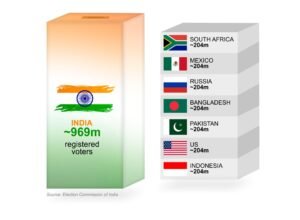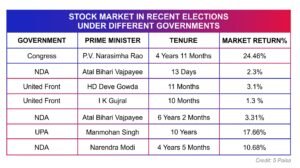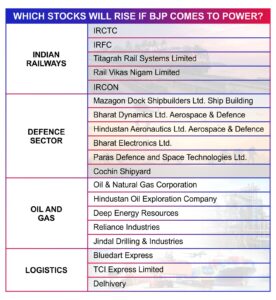Discover
-
Why do elections Impact the economy so much?
-
How Elections Impact the Stock Market?
-
Does the stock market impact businesses? If yes, how?
Who is going to win the elections 2024? Who will serve as the Prime Minister for the upcoming tenure?
While this may be the biggest question in our minds, have you ever thought about how General Elections will impact businesses?
Especially at a time when we all know India is emerging as one of the world’s largest startup ecosystems.
What is ahead for India? Let’s find the answers.
As the famous saying goes, ‘Change is the only constant.’ India is gearing up for General Elections. The Elections has started on April 19 and will conclude on June 1 2024. They ultimately decide and shape India’s leadership for the next five years.
Now, why are elections a big deal? It is not just about choosing who will be the leaders. It determines the course of India’s future political, social, and economic development.
However, elections can throw a curveball at businesses. How, you may wonder? We will get into that. But, before that let’s break down the nitty-gritty of the General Elections 2024.

Who is India’s Chief Election Commissioner?
India’s Chief Election Commissioner is Rajiv Kumar. He took charge as the 25th Chief Election Commissioner on 15th May 2022. He announced the schedule for the upcoming 18th Lok Sabha elections on March 16th.
Which are the main political parties contesting Lok Sabha Elections?

- Bharatiya Janata Party (BJP)
- Indian National Congress (INC)
- Aam Aadmi Party (AAP)
- Dravida Munnetra Kazhagam (DMK)
- All India Trinamool Congress (TMC)
Which are the 26 parties in the INDIA bloc?
Indian National Congress, All India Trinamool Congress (TMC), Dravida Munnetra Kazhagam (DMK), Aam Aadmi Party (AAP), Janata Dal (United), Rashtriya Janata Dal (RJD), Samajwadi Party (SP), Rashtriya Lok Dal (RLD), Communist Party of India (CPI), Communist Party of India (Marxist)
Communist Party of India (Marxist-Leninist) Liberation, Nationalist Congress Party (NCP), Shiv Sena (UBT), Jharkhand Mukti Morcha (JMM), Apna Dal (Kamerawadi), Jammu and Kashmir National Conference (NC), Peoples Democratic Party (PDP), Indian Union Muslim League (IUML), Revolutionary Socialist Party (RSP), All India Forward Bloc
Marumalarchi Dravida Munnetra Kazhagam (MDMK), Viduthalai Chiruthaigal Katchi (VCK), Kongunadu Makkal Desia Katchi (KMDK), Manithaneya Makkal Katchi (MMK), Kerala Congress (Mani), Kerala Congress (Joseph)
Read More: Will ‘One Nation, One Election’ Transform Indian Politics?
How do elections impact businesses?
The elections are being conducted till June 1. There will be some impact on the Indian economy, especially the businesses.
The General Elections 2024 will bring in new leadership. And new leadership means new policies. Let’s understand these changes.
General Elections 2024 will test the Bharatiya Janta Party’s hold on power. Moreover, Prime Minister Narendra Modi has a robust 78% approval rating to be re-elected for five more years. The General Elections 2024 campaign focuses on key demographics like women, youth, farmers and the impoverished.
Additionally, the foreign policy focuses on maintaining ties with Russia for energy and military support. Meanwhile, it also focuses on strengthening relations with the United States amid tensions with China.
Why do elections Impact the economy so much?
To answer this question, let us take the example of the stock market. Looking back on the previous elections, there have been some interesting trends. Moreover, these trends revolve around elections and the stock market.
How Elections Impact the Stock Market?
In 2004, when the BJP lost power, the market took a dip. But in 2009, when Congress held onto power, it surged. Likewise, the expectation of Modi’s leadership in 2014 resulted in a pre-election surge in the market. Recent events suggest a parallel anticipation in the market ahead of the upcoming general elections.

Elections can make the stock market unpredictable because they create a lot of uncertainty. One big reason elections affect the stock market a lot is that political parties work hard to boost the economy quickly to improve their chances of winning again.
Let’s explore what influences the connection between elections and the stock market.
What’s the Ideology of government?
Well, ideology plays quite an important role. The vision and economic roadmap of a winning party influence market sentiments. A party with clear economic plans and a focus on growth tends to boost share prices, while vague promises from another party can cause market uncertainty and price declines.
What lies in the Election Manifesto?
As we all know, the election manifesto outlines the promises and policies regarding the economy, society, and environment that political parties pledge to implement if they win. For instance, if a party vows to reduce tax rates and focuses on economic growth, it could lead to a rise in stock prices.
What are the results of Exit Polls?
Exit polls (a poll of voters taken immediately after they exit the polling stations) can sway market behaviour. Positive results for a party with strong economic policies may drive stock prices up, while a different outcome could create instability and lower prices.
What’s the Popularity of The Leader?
The charisma and influence of a leader can attract foreign investment and instil confidence in the market. A respected leader may contribute to a positive stock market trend.
Which Sectors would boom?
During pre-election and post-election periods, uncertainty doesn’t just influence the overall stock market; it also impacts specific industries. For instance, if the winning party prioritises infrastructure development, sectors like infrastructure and real estate may experience growth in their stock prices. But if the policies in the winning party’s manifesto negatively impact the pharmaceutical sector, it could result in a decline in the stock prices of pharmaceutical companies.
Which Stocks May Rise if BJP Comes to Power?

Other Stocks That May Rise
Startups
Since 2014, the startup culture in India has been gaining significant attention, especially under the BJP government. Back in 2016, there were only 442 startups in the country. However, by May 2023, this number unexpectedly surged to 99,371. Presently, over 100 of these startups have achieved unicorn status, meaning they are valued at over a billion dollars. If the BJP secures victory once more, it’s likely that this trend in the startup sector may continue to flourish.
Ethanol Sector
The Ethanol sector has made significant progress, promoted by initiatives like the Ethanol Blended Petrol (EBP) Programme. This program aims to reduce greenhouse gas emissions by blending ethanol with petrol, enhancing energy security, and supporting agriculture. Introduced in 2018, the ‘National Policy on Biofuels’ targets 20% ethanol blending by 2030, but effective actions since 2014 have accelerated this goal to around 2025-26.
Also Read: Stock Market Crash & Low Voting. Coincidence?
How Stock Market Impact Businesses?
The fluctuations in stock prices can affect many things in the economy, like how much people spend and how much businesses invest. Just as the stock market affects the economy, different factors also affect the stock market.
Here’s how the stock market impacts the Indian economy:
Wealth Effect
When stock prices go up during a “bull phase,” it usually makes people feel more confident about the economy. So, they tend to spend more on goods and services, which helps businesses grow. More investors might also join the market, pushing prices even higher. This can contribute to economic development, but not always.
Economic Growth
Sometimes, even when the stock market is doing well, it doesn’t mean the economy is growing. For example, in 2021-22, stock markets reached all-time highs, but the economy struggled due to the pandemic.
Bonds and Gold
When the stock market crashes, investors might prefer safer investments like bonds or gold, which can offer better returns during uncertain times.
Pension Funds
Many pension funds invest in stocks, so if stock prices fall a lot, it can affect the value of these funds. This could mean lower payouts for retirees, leading to less spending and savings.
Negative Impact
When stock prices fall for a long time (a “bear phase”), it usually has a negative effect. People may lose confidence, leading to less spending. News about falling prices can cause panic, making investors more cautious.
Summing Up
In conclusion, the upcoming General Elections 2024 in India hold significant implications for businesses across various sectors. The outcome of the elections, along with the policies implemented by the new government, will shape the economic landscape and influence market dynamics. With the potential for shifts in leadership and policy direction, businesses must stay vigilant and adapt to the changing environment to seize opportunities and mitigate risks. As we await the election results, one big question remains: How will businesses handle the evolving political and economic landscape to keep growing in the post-election scenario?
Also Read: What is the Significance of Market Research Before Investments in Stock Trading
Frequently Asked Questions
Who is the PM of India in 2024?
India’s PM in 2024 is Narendra Modi. However, the General Elections 2024 will decide who will be the next Prime Minister.
How many seats are there in Lok Sabha?
The Lok Sabha has a total of 545 seats.
Who became PM three times in India?
Atal Bihari Vajpayee served three terms as the 10th Prime Minister of India.
Who appoints the Prime Minister?
The President of India appoints the Prime Minister.
Who served the longest as the PM of India?
Jawaharlal Nehru served India for 16 years as the Prime Minister of India.
Who was the first CM of India?
Pandit Govind Ballabh Pant was the first chief minister of India.
How many political parties are there in India?
According to the Election Commission of India, there are 6 national parties, 57 state parties, and 2,764 unrecognised parties as of 23 March 2024.




